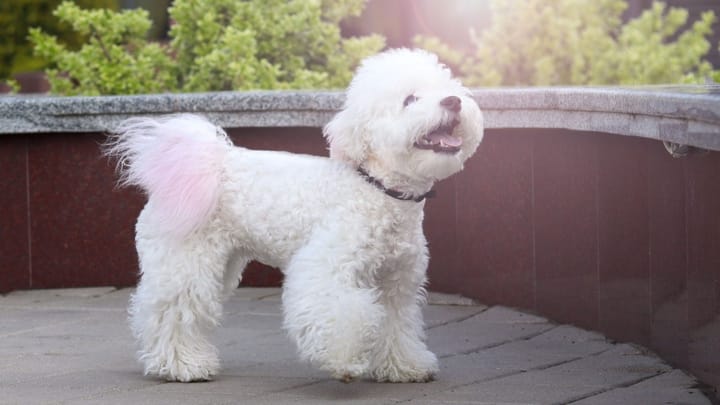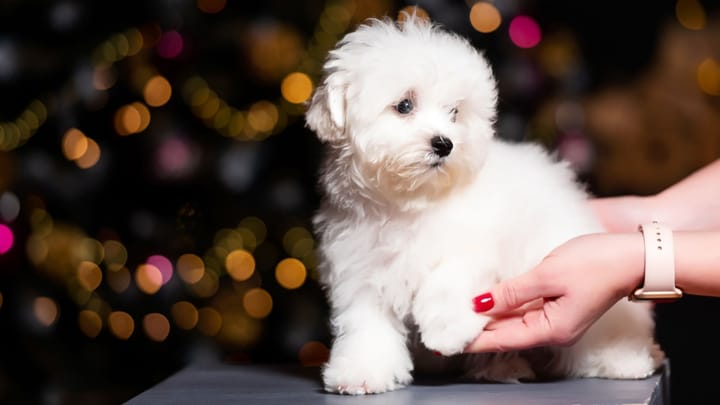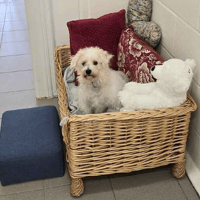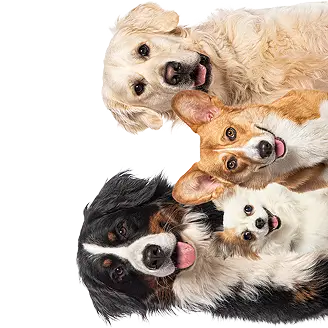Bichon Frise
Other names : Bichon, Bichon à poil frisé, Tenerife dog


Bichon Frises are small lap dogs who are affectionate, friendly, and love nothing more than to spend time with their owners. The Bichon breed is of Belgian and French heritage and was previously very popular among French aristocrats. During the French revolution, Bichons fell from popularity and earned their survival by performing with street musicians and organ grinders. During World War I, the breed almost went extinct, but dedicated breeders worked together to save them.
|
Life expectancy |
The Bichon Frise has a life expectancy of between 12 and 14 years |
|
Temperament |
|
|
Size |
Small
|
|
Adult size |
Female
Between 9 and 12 in
Male
Between 9 and 12 in
|
|
Adult weight |
Female
Between 9 and 15 lb
Male
Between 11 and 15 lb
|
|
Coat colour
Although the dog’s coat is generally completely white, as puppies they can have different coloured markings too (White ,apricot-white, buff-white). |
White |
|
Type of coat
Medium length coat. The Bichon Frise sports a silky, soft and fine white coat that has curls like corkscrews. Anywhere between 7 to 10 cm long, the coat is either left to grow naturally, or can also be trimmed. |
Long |
|
Eye colour
Dark and round, boasting black rims surrounded by haloes. |
Brown
|
|
Purchase price |
The Bichon Frise costs between £510 and £610 |
Bichon Frise translates from French to “curly lapdog”. Bichon is a type of lapdog and Frise means curly in English.
Many Bichon Frise pets have their own social media accounts and love nothing better than posing for photographs and selfies!
More details about the Bichon Frise
Bichon Frise: Origins and history
Dating as far back as the 13th century, the Bichon Frise is a descendant of the Poodle and the Barbet Water Spaniel. Previously traded worldwide by Spanish sailors and eventually becoming a favourite in French Royal courts during the 16th century. The dog fell out of favour and ended up on the streets working as a circus performer and an organ grinder’s pet. In more current days, the Bichon Frise is known as a show and companion dog.
Physical characteristics of the Bichon Frise
The Bichon Frise is a compact dog, yet totally in proportion. With a soft, pure white coat, the adult dog has a slightly rounded head, a shiny, black nose and dark eyes. They are very endearing with an alert and cute expression on their face. The dog’s ears are set high on his head and are covered in flowing, soft hair. The dog’s black lips give him a smiling appearance. The dog carries his tail raised but not curled over his back. A quite muscular body, strong back legs and well-rounded thighs, complete this little dog.
FCI classification of the Bichon Frise
-
Group 9 - Companion and Toy Dogs
-
Section 1 : Bichons and related breeds
Bichon Frise: Characteristics
Bichon Frise: Behaviour
Training a Bichon Frise
This intelligent pup is also quick witted and his main aim is to please his master. Providing you show him who rules the roost, he is easy to train as long as you use consistent methods. Check that the dog doesn’t develop “small dog syndrome” when he will take on the alpha dog role. This can of course, lead to unwanted behaviour problems. Toilet training may take a deal of patience and understanding as he can be more difficult to housetrain than other small breeds.
Bichon Frise: Lifestyle
Breed compatibility Bichon Frise
Bichon Frise: Purchase price
Expect to pay an average buying price of between £510 for a non KC registered pup to £610 for a KC registered dog.
As a small breed, feeding costs are never extortionate, however his grooming requirements can soon add up to be expensive. In addition, veterinary check-ups, vaccinations and the cost of neutering can amount to between £40 and £50 monthly.
Bichon Frise: Shedding
Light
The Bichon Frise sheds very little hair, which is good news for anyone that suffers from allergies.
Bichon Frise: Grooming
Because the Bichon Frise has such a thick and curly coat, grooming is more high maintenance than some other dogs. Frequent bathing and hair trimming is a necessity. With the show group, coat trimming is best done professionally with scissors, although with the pet group, electric clippers are often used for speed. Daily brushing is advised to prevent knots and tangles in the dog’s curly coat.
Bichon Frise: Health
Life expectancy of this breed is between 12 to 14 years, however some dogs have been noted to live to 20 years of age.
He may be a small dog, but he is certainly a tough cookie.
As a canine with a very thick coat, the Bichon Frise is at risk from suffering heat stroke in very warm weather. This is more so if they are physically active.
Certainly, the Bichon dog has a thick, dense coat that will help to defend him from the cold weather. A woolly coat will also help to prevent any chills when on his daily walk.
As is the case with many toy dog breeds, the Bichon can very easily put on excess weight if he lies on the sofa for most of the day and doesn’t care for much exercise. Owners often tend to offer lots of tasty treats to lap dogs, however of course, this can mean that the dog often gains weight very easily.
- Hip dysplasia
- Epilepsy
- Liver Shunt
- Crowded teeth
- Cushing’s Disease
- Diabetes






